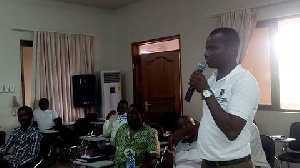 A resource person addressing the farmers
A resource person addressing the farmers
A Non-Governmental Organisation, Resourcetrust Network (RTN) has organized a training workshop for Smallholder Oil Palm and Rubber plantation farmers to deliberate on sustainable production solutions in Western Region.
The one-day training workshop was organized in conjunction with the Ghana Wildlife Society (GWS) to facilitate participation among key smallholder plantation actors to deliberate on smallholder plantation sustainable production solutions and be inspired to collaborate and contribute to supporting smallholder implementation of sustainability solutions in the Region.
The key Actors are Smallholder oil palm and rubber plantations farmers, government, NGOs and private businesses.
The training workshop was also to create a forum and means for easy participation of key smallholder rubber and Oil Palm plantation actors in deliberating on sustainable production solutions.
This project is being funded by the Critical Ecosystem Partnership Fund (CEPF) Guinean Forests of West Africa Programme small grant being managed by Birdlife International.
The training workshop was on the use of a joint Smallholder-Private-Public; Participation, Collaboration and Contribution (PCC) approach to supporting smallholder Plantations implementation of Best Management Practices.
Speaking at the workshop held over the weekend at Weber House, Agona Nkwanta in the Ahanta West Municipality, Mr. Joseph W. Osei, the Executive Director of RTN said "Smallholder agriculture plays critical role in all the major agriculture commodities in Ghana’s development and will continue to do so with increasing population and land fragmentation and its dynamic nature suited for climate change adaptation".
He added "Globally, smallholder agriculture has survived over the years and plays critical role in global commodity supply chains even with the introduction of industrial agriculture".
"The surrounding landscape of Cape Three Points Forest Reserve (a Key Biodiversity Area (KBA) within the Forest Reserves of South-eastern Côte d’Ivoire and South-western Ghana (SW CDI SE GH) conservation corridor –) has been converted largely to agriculture", he opined.
He revealed "Agriculture within this landscape is however practiced by smallholder oil palm and rubber plantation farmers as out growers for NORPALM and Ghana Rubber Estate Limited (GREL) respectively as the larger private sector operators. Agriculture activities within this landscape is regulated by government agencies from the Ahanta West Municipal Assembly (AWMA) such as the Ministry of Food and Agriculture among others".
According to him, Plantation agriculture among other agricultural and land use activities is the main source of livelihood for farming communities within this conservation corridor.
He bemoaned "However, plantation agriculture activities around this KBA within the conservation corridor has been the main driver of deforestation contributing to habitat damage, fragmentation, loss of biodiversity and impacting negatively on ecological functions (including potential reduction of climate change resilience)".
He added "Given that areas within the conservation corridor and around the KBA are agricultural lands, forest conversion and irreversible loss of biodiversity cannot be totally avoided but can be mitigated through the implementation of biodiversity conservation among other best management practices".
He believed "In the case of the area around Cape Three, implementation of best management practices can improve the structural connectivity and ecological function within the conservation corridor to the forest reserve".
"However, unlike their large scale plantation counterparts and experts from the government and other stakeholders, smallholder plantation farmers do not have adequate resources in terms of information, the technical expertise and tools, business cases for inspiration among others to enable them implement best management practices", he emphasized.
Mr. Osei asked "Given the crucial role of smallholder plantations in household livelihoods, contribution to local development, stable commodity supply and cooperate profitability, how do key actors ensure the sustainability of smallholder plantations and its benefits?"
He revealed "Resourcetrust Network (RTN), in partnership with Ghana Wildlife Society (GWS) is implementing the project 'Supporting Implementation of Best Management Practices in Smallholder Plantations' and believes that, a joint Smallholder-Private-Public participate to deliberate on the solutions, collaboration and contribution to implementation of solutions is the way to go".
On his part, Mr. Albert Bonnie who represented the Ministry of Food and Agriculture (MOFA) in the Ahanta West Municipality, thanked the NGO, Resourcetrust Network (RTN) for organizing such training workshop for Smallholder plantation oil palm and rubber plantation farmers in the area.
He said the MOFA's mission is to promote sustainable agriculture and thriving Agribusiness through research and technology development, effective Extension and other support services to farmers, fishermen, processors and traders for improved human livelihood.
"A modernised agriculture culminating in a structurally performed economy and evident in food security, employment opportunities and reduced poverty", he revealed MOFA's vision.
He said through Planting for Export and Rural Development program, government is supplying farmers with palm oil, rubber and coconut seedlings.
He, therefore, seized the opportunity and appealed to the farmers to embrace this program being initiated by this government.
Some of the farmers who spoke to GhanaWeb' Western Regional Correspondent after the workshop, expressed their profound gratitude to the NGO for organizing such a wonderful training for them and therefore promised to work hard and also work towards the advices given.
They seized the opportunity and pleaded with the government to beef up security at the Forest Reserves in the Region to arrest the illegal chainsaw operators from destroying these beautiful natural reserves.
At the end of the training workshop which lasted for eight hours, the Key Actors agreed and committed to continually and jointly participate to discuss sustainability solutions for smallholder rubber and oil palm plantation and to collaborate and contribute to the implementation of best management practices among smallholders.